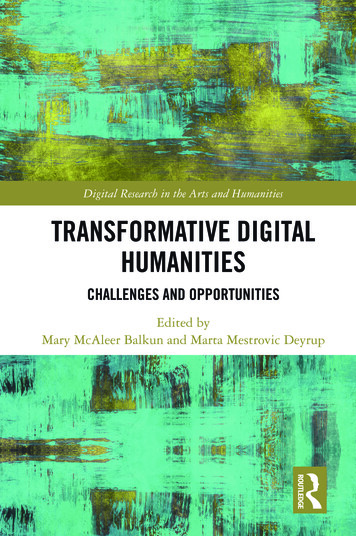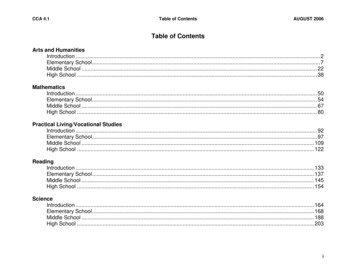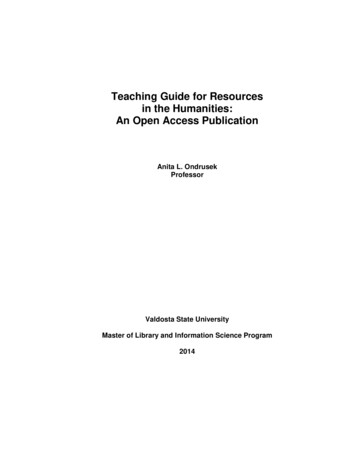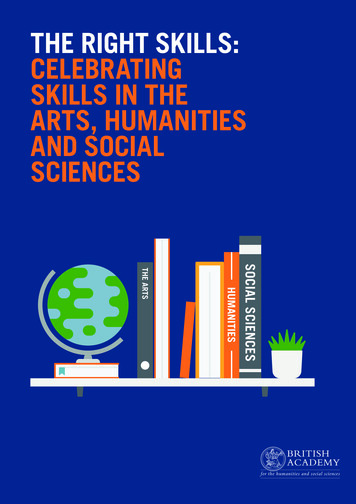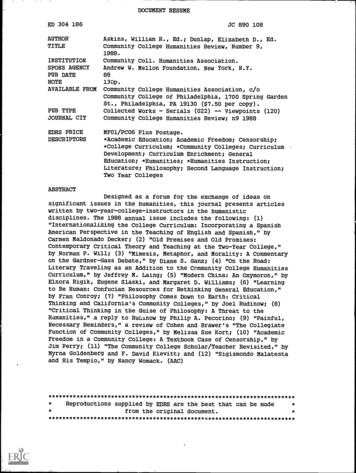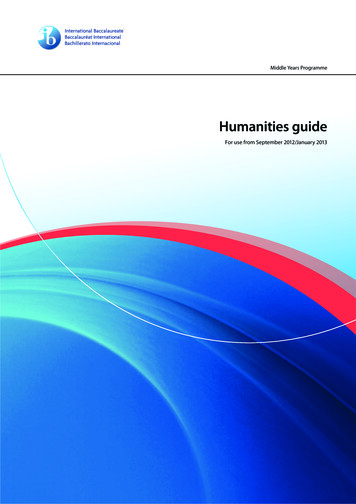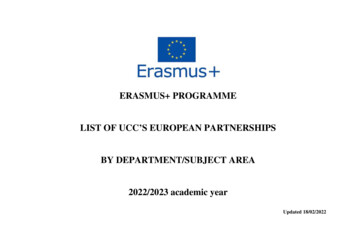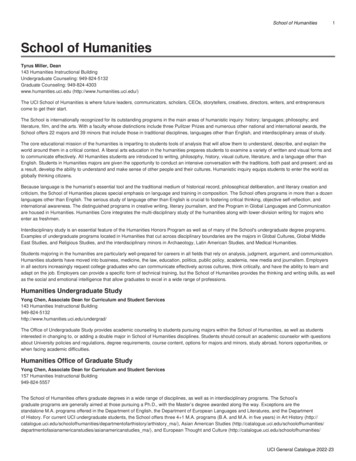
Transcription
School of Humanities1School of HumanitiesTyrus Miller, Dean143 Humanities Instructional BuildingUndergraduate Counseling: 949-824-5132Graduate Counseling: 949-824-4303www.humanities.uci.edu (http://www.humanities.uci.edu/)The UCI School of Humanities is where future leaders, communicators, scholars, CEOs, storytellers, creatives, directors, writers, and entrepreneurscome to get their start.The School is internationally recognized for its outstanding programs in the main areas of humanistic inquiry: history; languages; philosophy; andliterature, film, and the arts. With a faculty whose distinctions include three Pulitzer Prizes and numerous other national and international awards, theSchool offers 22 majors and 39 minors that include those in traditional disciplines, languages other than English, and interdisciplinary areas of study.The core educational mission of the humanities is imparting to students tools of analysis that will allow them to understand, describe, and explain theworld around them in a critical context. A liberal arts education in the humanities prepares students to examine a variety of written and visual forms andto communicate effectively. All Humanities students are introduced to writing, philosophy, history, visual culture, literature, and a language other thanEnglish. Students in Humanities majors are given the opportunity to conduct an intensive conversation with the traditions, both past and present; and asa result, develop the ability to understand and make sense of other people and their cultures. Humanistic inquiry equips students to enter the world asglobally thinking citizens.Because language is the humanist’s essential tool and the traditional medium of historical record, philosophical deliberation, and literary creation andcriticism, the School of Humanities places special emphasis on language and training in composition. The School offers programs in more than a dozenlanguages other than English. The serious study of language other than English is crucial to fostering critical thinking, objective self-reflection, andinternational awareness. The distinguished programs in creative writing, literary journalism, and the Program in Global Languages and Communicationare housed in Humanities. Humanities Core integrates the multi-disciplinary study of the humanities along with lower-division writing for majors whoenter as freshmen.Interdisciplinary study is an essential feature of the Humanities Honors Program as well as of many of the School's undergraduate degree programs.Examples of undergraduate programs located in Humanities that cut across disciplinary boundaries are the majors in Global Cultures, Global MiddleEast Studies, and Religious Studies, and the interdisciplinary minors in Archaeology, Latin American Studies, and Medical Humanities.Students majoring in the humanities are particularly well-prepared for careers in all fields that rely on analysis, judgment, argument, and communication.Humanities students have moved into business, medicine, the law, education, politics, public policy, academia, new media and journalism. Employersin all sectors increasingly request college graduates who can communicate effectively across cultures, think critically, and have the ability to learn andadapt on the job. Employers can provide a specific form of technical training, but the School of Humanities provides the thinking and writing skills, as wellas the social and emotional intelligence that allow graduates to excel in a wide range of professions.Humanities Undergraduate StudyYong Chen, Associate Dean for Curriculum and Student Services143 Humanities Instructional undergrad/The Office of Undergraduate Study provides academic counseling to students pursuing majors within the School of Humanities, as well as studentsinterested in changing to, or adding a double major in School of Humanities disciplines. Students should consult an academic counselor with questionsabout University policies and regulations, degree requirements, course content, options for majors and minors, study abroad, honors opportunities, orwhen facing academic difficulties.Humanities Office of Graduate StudyYong Chen, Associate Dean for Curriculum and Student Services157 Humanities Instructional Building949-824-5557The School of Humanities offers graduate degrees in a wide range of disciplines, as well as in interdisciplinary programs. The School’sgraduate programs are generally aimed at those pursuing a Ph.D., with the Master’s degree awarded along the way. Exceptions are thestandalone M.A. programs offered in the Department of English, the Department of European Languages and Literatures, and the Departmentof History. For current UCI undergraduate students, the School offers three 4 1 M.A. programs (B.A. and M.A. in five years) in Art History tmentofarthistory/arthistory ma/), Asian American Studies tmentofasianamericanstudies/asianamericanstudies ma/), and European Thought and Culture (http://catalogue.uci.edu/schoolofhumanities/UCI General Catalogue 2022-23
2School of europeanthoughtandculture ma/). In addition, the Department of English administers the M.F.A. Program inWriting (Fiction/Poetry) tmentofenglish/english mfa/).The School of Humanities houses six graduate emphases that may be pursued in conjunction with study toward the doctorate: Asian AmericanStudies tmentofasianamericanstudies/asianamericanstudies graduateemphasis/), CriticalTheory sisincriticaltheory/), Feminist Studies tmentofgenderandsexualitystudies/feministstudies emphasis/), Latin American Studies alprograms/latinamericanstudies emphasis/), Medical Humanities alprograms/medicalhumanities emphasis/), and Visual Studies ateprograminvisualstudies/visualstudies emphasis/). In addition, the School also offers graduate specializations in Ancient Iran and the Premodern Persianate ancientiranandpremodernpersianateworld/) and Persian/Iranian Studies aniranianstudies specialization/).Graduate students participate in the affairs of the School of Humanities by serving as representatives on various departmental, schoolwide, andcampuswide committees.Honors at GraduationCampus criteria for honors at graduation are described in the section Honors Recognition (http://catalogue.uci.edu/honors/). In addition to campuscriteria, the School of Humanities uses cumulative GPA as the criterion for the awarding of Honors at Graduation. The official designation of Honors onthe diploma and transcript will be based upon the candidate’s cumulative GPA and total units completed at the end of the final quarter.Humanities Honors ProgramJeffrey Wasserstrom, Director143 Humanities Instructional Building949-824-5132; ors.php ties/honors.php)The Honors Program within the School of Humanities is a two-year, upper-division program designed to challenge exceptional students from all majorsby providing special opportunities for intellectual growth in an interdisciplinary setting. Honors students benefit from small seminars, individual facultyattention, peer support, and the chance to pursue independent research. They think deeply about the meaning and value of humanistic inquiry and thusactively shape its future while honing their skills as thinkers, writers, and citizens of the world.Humanities Honors students complete a two-part course of study. In their junior year, students take three quarters of an interdisciplinary Proseminar(HUMAN H120) organized around a single topic or problem, such as the borders of human life, crime and punishment, state and civil society, or visionand visibility. The sequence is designed to compare and contrast modes of analysis and critical thinking in several disciplines in the Humanities, such ashistory, literary studies, and philosophy. In a small seminar setting, students are encouraged to become reflective about their own chosen disciplines.In their senior year, students take a sequence of courses beginning in the fall with a Senior Honors Seminar (HUMAN H140), and continuing in thewinter and spring with the Senior Honors Thesis (HUMAN H141) and the Senior Honors Colloquium (HUMAN H142W), in which they complete anindependent research project under the direction of a faculty member on a topic chosen by the student. A prize is awarded for the year’s outstandingthesis.In both sequences, the Honors students benefit from their close association with exceptional scholars and the challenge and support of their intellectualpeers.Students interested in learning how the Humanities Honors Program will fit into their regular courses of study are encouraged to contact the HumanitiesOffice of Undergraduate Study wide Honors CollegiumThe Campuswide Honors Collegium is available to selected high-achieving students from all academic majors from their freshman through senior years.For more information contact the Campuswide Honors Collegium, 1200 Student Services II; 949-824-5461; honors@uci.edu; or visit the CampuswideHonors Collegium website (http://honors.uci.edu/).Humanities Out There (H.O.T.) ProgramHumanities Center, Humanities Gateway 1st Floor949-824-1662Humanities Out There is a community-based internship collaboration between UCI’s School of Humanities and local cultural institutions. In addition toworking three hours a week on a public humanities project with a partner organization, undergraduate students attend weekly seminars to learn aboutdiverse theories and methodologies relating to teaching and learning. The H.O.T. Practicum is a wonderful opportunity to learn about community-basedcultural programming and develop practical skills for future tutors, teachers, and other educators.Requirements for undergraduates include attending weekly on-campus seminars and interning three hours each week with a local cultural organizationor a campus unit. All UCI students are eligible to enroll for 2 Units, P/NP in HUMAN 195.UCI General Catalogue 2022-23
School of Humanities3Dr. Samuel M. Jordan Center for Persian Studies and CultureTouraj Daryaee, Director1118 Humanities ersianstudies/sjalalip@uci.edu ( sjcps@uci.edu)The Samuel Jordan Center for Persian Studies and Culture is devoted to the study of Iran and the Persianate world. Drawing on the strengths of theentire campus, the Center focuses on interdisciplinary research projects that bridge the arts, humanities, engineering, medicine, and the sciences. TheCenter sponsors events such as lectures, performances, and film screenings that draw a campus and community audience throughout the year.Courses, including language, literature, history, art history, music, and culture at the undergraduate and graduate levels, are the backbone of theCenter’s academic and pedagogical mission. These academic courses are offered by affiliated faculty and administered by different units. TheProgram in Global Languages and Communication offers courses on Persian language. Courses in ancient, medieval, and modern Persian historyare administered by the Department of History. Courses on modern Persian literature and the literature of Iranian diaspora are offered through theDepartment of Comparative Literature. Courses on the art history and archaeology of ancient Iran and Iranian visual culture are available through theDepartment of Art History. And courses on Persian music are housed within the Department of Music. A list of courses and information on the PersianStudies minor is available on the minor’s website /). Information about the Graduate Specializationsin Ancient Iran and the Premodern Persian World and Persian/Iranian Studies is available on the Humanities website ram/specialization.php).Humanities Peer Mentor ProgramThe Humanities Peer Mentor Program is designed to address some of the academic, cultural, and social needs of freshmen in the School of Humanities.While all new Humanities freshmen will benefit from participation in the program, it is particularly useful for new first generation college students. It hasa goal of developing leadership skills in both the mentors and the proteges/mentees. The program features two-tiered mentoring, with successful upperdivision students mentoring small groups of new students, and the student mentors in turn working with faculty and staff. Another focus of the program isto encourage the student mentors to go on to graduate school.Participants attend workshops on topics such as communication styles, study skills, procrastination and time management, the imposter syndrome, etc.,as well as take part in a variety of more social events. They also produce weekly journals in which they express their ideas and raise issues for theirmentors. For additional information, contact the Humanities Office of Undergraduate Study ge Other than English Placement and ProgressionThe following policies apply to all UCI students taking language other than English courses.Language Other Than English Progression. Within the beginning and intermediate language instructional sequences (1A-B-C and 2A-B-C, andfor Latin and Greek, 1A-B-C and 100) students must earn a grade of at least C (or Pass) in order to advance to the next level of instruction, unless anexception is permitted by the appropriate course director and the Associate Dean of Humanities for Curriculum and Student Services. A student may notgo back and take a lower-level course for credit once a more advanced level has been completed with a passing grade. Nor may a student be enrolled inmore than one level of the same language at the same time (for example, a student may not enroll in language 2B and 2C concurrently).Language Other Than English Placement. Placement tests are required for the following languages: Arabic, Armenian, Chinese, Hebrew, Japanese,Korean, Persian, Russian, Spanish, and Vietnamese. Contact the UCI Academic Testing Center (http://www.testingcenter.uci.edu/) for information or toregister for an exam. Placement tests are recommended but not required for French and German language courses. The purpose of placement testing isto ensure success in UCI language courses.For languages other than English which are not listed above (and for French and German if the placement test is not taken), students entering UCI withprevious high school language training only are placed as follows: in general, one year of high school work is equated with one quarter of UCI work.Thus, students with one, two, three, or four years of high school language other than English will normally enroll in 1B-, 1C-, 2A-, or 2B-level languagecourses, respectively. Students who opt to “go back” one quarter will earn credit (i.e., a student with three years of high school language other thanEnglish may opt to take 1C instead of 2A). If it has been five or more years since the last high school course, the student may begin at 1A for credit.Exceptions must have the approval of the appropriate course director and the Associate Dean of Humanities for Curriculum and Student Services.Students will not receive credit for repeating at UCI language other than English courses for which they received transfer credit from another institution,even if they are placed by testing into the equivalent of a previously taken course.Language Other Than English Advanced Placement Credit. Students cannot earn units or grade points at UCI in courses from which they havebeen exempted on the basis of Advanced Placement credit. However, since Advanced Placement awards a maximum of 8 units for scores of 4 and 5,students may elect to take 2C or the equivalent for credit.Native Speakers of Languages Other Than English. A native speaker of a language other than English is defined by the University as someonewho attended the equivalent of secondary school in another country where the language of instruction was other than English. Students with priorbackground in a language other than English should consult the UCI Academic Testing Center to see if a placement test is available to demonstrateUCI General Catalogue 2022-23
4School of Humanitiescompetence in that language. If an appropriate means of evaluating competence in a non-English language of instruction does not exist, satisfactorycompletion, with a C average or better, or equivalent, of one year of formal schooling at the 10th-grade level or higher in an institution where thelanguage of instruction is not English will meet the School of Humanities Language Other Than English requirement equal to second-year language.Appropriate documentation and translation, when necessary, must be presented to substantiate that the course work was completed. For some majorsoffered by the School of Humanities, students may be exempted from taking third-year language study in that language. In this case, the student mustsubstitute appropriate upper-division courses in the major to replace the number of exempted courses. For example, if a native speaker of Spanish isexempted from SPANISH 3 and/or SPANISH 3H, that student must replace the course with an upper-division Spanish course offered by the Departmentof Spanish and Portuguese.Repeating Deficient Foreign Language Other Than English Grades. First- and second-year language other than English courses are sequential andeach is prerequisite to the next. This is also true for third-year Chinese and Japanese courses. Students wishing to repeat a deficient grade in one ofthese courses must repeat it prior to continuing on to the next level of the language. A student may not go back and retake a lower-level course for creditonce a more advanced level has been completed with a passing grade.Study Abroad CenterThe Study Abroad Center assists students in taking advantage of the many worldwide opportunities that exist for study, work, internship, volunteering,and research. School of Humanities majors and minors can benefit from a broader perspective of their fields by studying for one year at a universityin such countries as China, France, Germany, Italy, Japan, Russia, Spain, or the United Kingdom. Visit the Study Abroad Program website (http://www.studyabroad.uci.edu/) or an academic counselor for additional information. Critical Theory, Graduate Emphasis Department of African American Studies Department of Art History Department of Asian American Studies Department of Classics Department of Comparative Literature Department of East Asian Studies Department of English Department of European Languages and Studies Department of Film and Media Studies Department of Gender and Sexuality Studies Department of History Department of Philosophy Department of Spanish and Portuguese Graduate Program in Visual Studies Special Programs Undergraduate Program in Global Cultures Undergraduate Program in Religious StudiesRequirements for the Bachelor’s DegreeAll students must meet the University Requirements udents/requirementsforabachelorsdegree/).School Requirements1. Satisfactory completion of HUMAN 1A-HUMAN 1AS-HUMAN 1B-HUMAN 1BS-HUMAN 1C-HUMAN 1CS taken for letter grades in the freshmanyear.Transfer students in all majors in the School of Humanities may substitute for the Humanities Core appropriate course work as described on theSchool of Humanities website /core.php). No overlap is permitted between the Humanities Coresubstitution and a student’s departmental/major requirements.2. College-level course work equivalent to UCI’s sixth quarter of study (2C level, or for Latin or Greek, one 103 and one 104, or two 103s or 104s) ina language other than English or equivalent competence. The final course must be taken for a letter grade and passed with a grade of C or better.NOTE: Please refer to the course listings in the Catalogue (http://catalogue.uci.edu/allcourses/ (http://catalogue.uci.edu/allcourses/)) for informationregarding required prerequisites for the 2C level language courses, or Latin or Greek 103 or 104.Unless otherwise specified, courses taken to satisfy major, minor, and school requirements must be a minimum of 4 units each. Unless otherwisespecified, no more than one independent or directed group study course may be petitioned toward major or minor requirements. Unless otherwisespecified, all courses taken to satisfy major and school requirements must be taken for a letter grade.UCI General Catalogue 2022-23
School of Humanities5Quarterly consultation with a faculty advisor is recommended.Maximum Overlap Between Major Requirements: In fulfilling degree requirements for multiple majors, a maximum of two courses may overlapbetween any two majors.Maximum Overlap Between Major and Minor Requirements: In fulfilling minor requirements, a maximum of two courses may overlap between amajor and a minor. No course overlap is permitted between minors.Normal Progress in the Major: School of Humanities majors are expected to take at least one course required for their major program each quarter aswell as make progress toward the completion of the School’s language other than English requirement.School Residence Requirement: At least five upper-division courses required for each major must be completed successfully at UCI. Completionof a minor program is optional; however, for certification in a minor, at least four upper-division courses required for the minor must be completedsuccessfully at UCI. See individual major and minor requirements for specific courses and how participation in the Education Abroad Program (EAP) canaffect the residence requirement. Exceptions are considered on a case-by-case basis and decided in consultation between the appropriate departmentor faculty member and the Associate Dean of Humanities for Curriculum and Student Affairs.Internship Policy. In most cases, Humanities students are not allowed to earn credit for off-campus internships. However, if a department or programdetermines that the internship is academically appropriate and promotes the student’s academic goals, the student may take the internship asIndependent Study and unit credit will be given. The sponsoring department or program and the instructor will in all cases require a substantial academicproduct, such as a paper, growing out of the internship.A student who wishes to seek approval for an off-campus internship and earn course credit must file an Independent Study form with the department/program of the sponsoring faculty. A student who wishes to apply approved credit toward degree requirements, other than elective units, must alsopetition for approval from the Humanities Undergraduate Study Office, prior to beginning the internship.UCI approved internship courses are applied to major requirements as specified by individual major requirements.Change of Major. Students who wish to change their major to one offered by the School of Humanities should contact the Humanities UndergraduateCounseling Office for information about change-of-major requirements, procedures, and policies. Information is also available at the UCI Change ofMajor Criteria website (http://www.changeofmajor.uci.edu/). African American Studies, B.A. African American Studies, Minor Ancient Iran and the Premodern Persianate World, Graduate Specialization Archaeology, Minor Armenian Studies, Minor Art History, B.A. Art History, M.A. (4 1) Art History, Minor Asian American Studies, B.A. Asian American Studies, Graduate Emphasis Asian American Studies, M.A. (4 1) Asian American Studies, Minor Asian Studies, Minor Chinese Language and Literature, Minor Chinese Studies, B.A. Chinese Studies, Minor Classical Civilization, Minor Classics, B.A. Classics, M.A. Classics, Ph.D. Comparative Literature, B.A. Comparative Literature, M.A. Comparative Literature, Minor Comparative Literature, Ph.D. Creative Writing, Minor Critical Theory, Graduate Emphasis Culture and Theory, Ph.D.UCI General Catalogue 2022-23
6School of Humanities East Asian Cultures, B.A. East Asian Studies, Ph.D. English, B.A. English, M.F.A. English, Minor English, Ph.D. European Studies, B.A. European Studies, Minor European Thought and Culture, M.A. (4 1) Feminist Studies, Graduate Emphasis Film and Media Studies, B.A. Film and Media Studies, Minor French, B.A. French, Minor Gender and Sexuality Studies, B.A. Gender and Sexuality Studies, Minor German Studies, B.A. German Studies, Minor German, Ph.D. Global Cultures, B.A. Global Cultures, Minor Global Middle East Studies, B.A. Global Middle East Studies, Minor Greek, Minor History, B.A. History, M.A. History, Minor History, Ph.D. Humanities and Law, Minor Italian Studies, Minor Japanese Language and Literature, B.A. Japanese Language and Literature, Minor Japanese Studies, Minor Jewish Studies, Minor Korean Literature and Culture, B.A. Korean Literature and Culture, Minor Latin American Studies, Graduate Emphasis Latin American Studies, Minor Latin, Minor Literary Journalism, B.A. Literary Journalism, Minor Master of English Medical Humanities, Graduate Emphasis Medical Humanities, Minor Persian Studies, Minor Persian/Iranian Studies, Graduate Specialization Philosophy, B.A. Philosophy, Minor Philosophy, Ph.D. (School of Humanities) Queer Studies, Minor Religious Studies, B.A. Religious Studies, MinorUCI General Catalogue 2022-23
School of Humanities7 Russian Studies, Minor Spanish, B.A. Spanish, M.A. Spanish, Minor Spanish, Ph.D. Spanish/English Bilingual Education, Minor Visual Studies, Graduate Emphasis Visual Studies, Ph.D.Academic English CoursesAC ENG 20A. Academic Writing. 5 Units.Grammar, sentence structure, paragraph and essay organization of formal written English.Prerequisite: Placement into AC ENG 20A.Grading Option: Pass/no pass only.AC ENG 20B. Academic Writing. 5 Units.Grammar, sentence structure, paragraph and essay organization of formal written English.Prerequisite: AC ENG 20A. Placement into AC ENG 20B is also accepted.Grading Option: Pass/no pass only.AC ENG 20C. Essentials of Academic Writing. 5 Units.Grammar, sentence structure, paragraph and essay organization of formal written English.Prerequisite: AC ENG 20B. Placement into AC ENG 20C is also accepted.Grading Option: Pass/no pass only.AC ENG 20D. Academic Writing. 5 Units.Grammar, sentence structure, paragraph and essay organization of formal written English.Prerequisite: AC ENG 20CGrading Option: Pass/no pass only.AC ENG 22A. Academic English Reading and Vocabulary. 2 Units.Intensive reading exercises with occasional practice in extensive reading, focusing on comprehension, development of vocabulary, syntax, rhetoricalfeatures, reading strategies, and study skills.Prerequisite: Placement into AC ENG 22A is required.AC ENG 22B. ESL Reading and Vocabulary. 2 Units.Extensive reading and discussion with emphasis on journal articles, textbook chapters, notetaking, and the interpretation of charts, diagrams, tables, andfigures.Grading Option: Pass/no pass only.AC ENG 29. Special Topics in ESL. 2 Units.Directed and individualized work in English as a second language not covered in the AC ENG 20, 21, 22 sequence.Grading Option: Pass/no pass only.Repeatability: Unlimited as topics vary.UCI General Catalogue 2022-23
8School of HumanitiesAC ENG 139W. Advanced Academic Writing Across the Curriculum. 4 Units.Designed for transfer students who speak English as a second language. Focuses on developing academic reading and writing skills including essaycontent, organization, vocabulary, and grammar. Academic content also covered.Prerequisite: Satisfactory completion of the Lower-Division Writing requirement.Restriction: Restricted to students whose first language is not English.(Ib)AC ENG 200. Oral English Communication I. 2 Units.Designed to help students hear and produce the sounds of English as an International Language with greater accuracy and confidence. Focuses onpronunciation features (e.g., consonant sounds, consonant clusters, vowels, thought groups, and nuclear stress).Grading Option: Satisfactory/unsatisfactory only.Repeatability: May be taken for credit 3 times.Restriction: Graduate students only.AC ENG 201. Oral English Communication II. 2 Units.Designed to help students develop conversational fluency in English as an International Language. Focuses on applying knowledge of linguistic featuresand communicative skills during conversational exchange in a variety of social, academic, and professional contexts.Grading Option: Satisfactory/unsatisfactory only.Repeatability: May be taken for credit 3 times.Restriction: Graduate students only.AC ENG 202. Oral English Communication III. 2 Units.Designed to help students hone their public speaking skills in English as an International Language. Focuses on preparing, organizing, and deliveringspeeches and presentations and interacting with the audience, emphasizing skills needed in academic settings.Prerequisite: AC ENG 23A or AC ENG 23BGrading Option: Satisfactory/unsatisfactory only.Repeatability: May be taken for credit 3 times.Restriction:
School of Humanities 1 School of Humanities Tyrus Miller, Dean 143 Humanities Instructional Building . Global Middle East Studies, and Religious Studies, and the interdisciplinary minors in Archaeology, Latin American Studies, and Medical Humanities. . Associate Dean for Curriculum and Student Services 143 Humanities Instructional Building .

